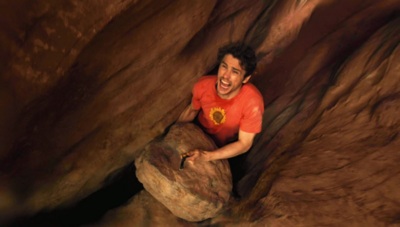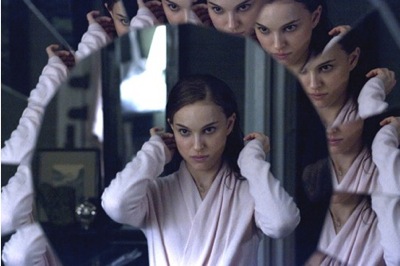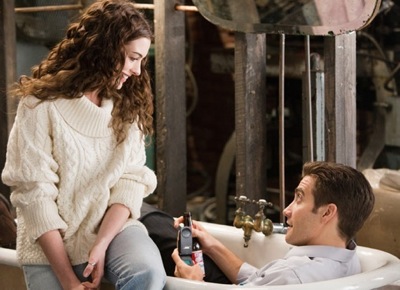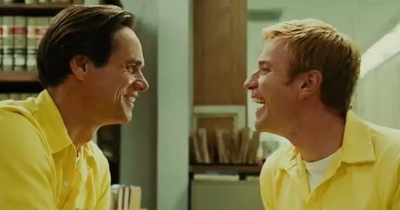 After a longer-than-intended break I planned to write a catch-up column, reeling in some of the movies I’ve been seeing these past few weeks. And there have been a lot of films to catch up on, so many it’s been hard to find time to write about them. Membership has its privileges, and one benefit of being a member (newly minted) of the Online Film Critics Society is that it brings you an awful lot of films in your mailbox, besides the ones I need to see in theaters. So, I thought, proceed alphabetically, Black Swan…or does 127 Hours come first…hmm…
After a longer-than-intended break I planned to write a catch-up column, reeling in some of the movies I’ve been seeing these past few weeks. And there have been a lot of films to catch up on, so many it’s been hard to find time to write about them. Membership has its privileges, and one benefit of being a member (newly minted) of the Online Film Critics Society is that it brings you an awful lot of films in your mailbox, besides the ones I need to see in theaters. So, I thought, proceed alphabetically, Black Swan…or does 127 Hours come first…hmm…
And then, just when I thought it was safe to go back to my MacBook Pro, it happened: an avalanche of awards, citations, and nominations. The National Board of Review. The Broadcast Film Critics Association. The Los Angeles Film Critics Association. The New York Film Critics’ Circle. New York Film Critics Online. Boston Film Critics. Houston Area Film Critics. Detroit Film Critics Society. The Indiana Film Journalists Association. And more: Washington, D.C., St. Louis, Southeast. Still the onslaught continues, right on through the announcement of the Golden Glop, err, I mean, “Globes.” If James Franco thought it was bad having his arm pinned by a boulder in 127 Hours, wait until he has to elbow his way through his living room, filled as it will be with plaques and trophies and statuettes.
 If nothing else all this end-of-year activity is a rebuke to anyone who thinks film criticism is dead. Detroit may be limping along economically but there are enough film critics to fill a society. On the other hand, what they’re making, or who their readership is, is open to question, in the Motor City and beyond. Each year the line between “professional” and “hobbyist” gets blurrier–maybe it’s just about to fade away, as print and online “outlets” afford one another respect, however grudgingly.
If nothing else all this end-of-year activity is a rebuke to anyone who thinks film criticism is dead. Detroit may be limping along economically but there are enough film critics to fill a society. On the other hand, what they’re making, or who their readership is, is open to question, in the Motor City and beyond. Each year the line between “professional” and “hobbyist” gets blurrier–maybe it’s just about to fade away, as print and online “outlets” afford one another respect, however grudgingly.
Of course they’re already meeting in the middle, at these honors ceremonies. They all have their own rules and regulations and quirks, yet year in year out the nominees and winners are pretty consistent with each other, as if someone in Boston is phoning someone in Indiana and dictating a vote. Indiewire has taken it upon itself to track the tallies and the results are, well, not fascinating. To some extent I get it; I haven’t seen anything (yet) that will dislodge The Social Network from the top of my heap, and a number of most lauded pictures are sure to fill out the other nine slots on my Top Ten list. But there’ll be a few surprises in there, too, movies that will surprise even me with how much they’ve grown in my estimation over the last 12 months (or preceding 12 days if it’s a year-ender seen before I compile it). These consensus picks steamroll over individual taste and eccentricity and mash everything together into one middlebrow stew.
Which is why it’s nice to see a few wild card winners break through. Niels Arestrup, so arresting in A Prophet, should feel good about himself for snagging best supporting actor in L.A. So should Kim Hye-Ja, excellent in the Korean film Mother, L.A.’s best actress. Juliette Lewis (remember her?) can take a bow in Boston, where she won best supporting actress for Conviction. That moves that screener, as yet unopened, (near) to the top of my pile. There must be something there for her to have outmaneuvered the juggernauts.
Why aren’t there more surprises? The title of the Indiewire piece is telling: “Tracking the Oscar precursors.” It used to be that Academy Award prognosticating was more or less confined to before the nominations and during the run up to the big show, but the web has made it year-round, with every possible contender moved around the chessboard. No doubt this frenzy leaks into the calculations, with no one wanting to checkmate the front runners once they emerge and everyone wanting to join in the coronation. That’s very considerate, but the uniformity of choice is stifling. There are a lot of voices out there in Indiana, Detroit, and Chicago; why does the group voice have to have Oscar’s ear?
 Speaking for myself (and maybe only for myself) I wasn’t wowed by Natalie Portman in Black Swan. I’m never wowed by Natalie Portman; she’s always competent, and sometimes exceeds my expectations (she was an Oscar nominee for Closer). I get the “transformative,” Charlize-Theron-in-Monster vibe she throws off in the film. She obviously worked hard at the steps, threw herself into the trashy male fantasy aspects of the script (I like the New York City Ballet, I’ve sat in on several NYCB rehearsals, and unless they were putting on a show for the guests it’s work, work, work for these women and men and not Showgirls bitchery), and went from white to black as required–but I was always aware of her labor. She never “became,” as her hectoring director (Vincent Cassel, as capable and unexceptional as Mila Kunis and Barbara Hershey in their stock doppelganger and gargoyle mother roles) demands. (And, at the cusp of 30, she must promise to retire that little girl voice of hers, having maxed it out here, intentionally if irritatingly.) The whole movie, laced with references and borrowings from All About Eve and The Red Shoesand Repulsion to Stephen King and Brian De Palma, got under my skin as much as poor Portman’s, and not in a good way. A tour-de-not much, it’s the weakest film in the estimable career of filmmaker Darren Aronofsky, and the year’s most puzzling critical success.
Speaking for myself (and maybe only for myself) I wasn’t wowed by Natalie Portman in Black Swan. I’m never wowed by Natalie Portman; she’s always competent, and sometimes exceeds my expectations (she was an Oscar nominee for Closer). I get the “transformative,” Charlize-Theron-in-Monster vibe she throws off in the film. She obviously worked hard at the steps, threw herself into the trashy male fantasy aspects of the script (I like the New York City Ballet, I’ve sat in on several NYCB rehearsals, and unless they were putting on a show for the guests it’s work, work, work for these women and men and not Showgirls bitchery), and went from white to black as required–but I was always aware of her labor. She never “became,” as her hectoring director (Vincent Cassel, as capable and unexceptional as Mila Kunis and Barbara Hershey in their stock doppelganger and gargoyle mother roles) demands. (And, at the cusp of 30, she must promise to retire that little girl voice of hers, having maxed it out here, intentionally if irritatingly.) The whole movie, laced with references and borrowings from All About Eve and The Red Shoesand Repulsion to Stephen King and Brian De Palma, got under my skin as much as poor Portman’s, and not in a good way. A tour-de-not much, it’s the weakest film in the estimable career of filmmaker Darren Aronofsky, and the year’s most puzzling critical success.
And I have a bone to pick with Franco, too (though not the one he shatters in The Scene from 127 Hours). He’s very good in the movie, and if they gave out awards for most improved he’d be the clear winner. After a promising start in a James Dean TV movie who hadn’t given him up for dead after Spider-Man 3 and other far less visible fiascoes? But Danny Boyle’s film builds on a solid turnaround (and a goofy “multimedia” sideline) and gives him a shot in the…arm (I will try to restrain myself from now on). I wish we could have spent more time with him, though; once he’s cavebound the movie splits him into digital images and flashbacks and does everything it can to get him out of that enclosed space, dissipating the earlier tension. It rallies for The Scene, when it’s time for the movie’s take on Aron Ralston to let go of what’s holding him back physically and metaphorically and get free, but with Boyle shooting the works (sometimes quite thrillingly, such is the skill of DP Anthony Dod Mantle with lunar-like landscapes and other wonders) I never felt Franco was able to give us the measure of the man. Maybe I would have preferred a movie more in keeping with the tone of the title of Ralston’s book about his entrapment, Between a Rock and a Hard Place; the cheek is largely absent from this flourish-stuffed account.
 Earlier I made fun of the Golden Globes; doesn’t everyone? Look at the material they give us: A nod to the dreadful Alice in Wonderland? Two nominations for Johnny Depp, one for Alice and another for the said-to-be-worse-but-no-way-in-hell-I’m-finding-out The Tourist? Michael Douglas for the bankrupt Wall Street sequel while his superior performance in the much better Solitary Man has to go it alone? I can’t raise my eyebrows high enough. But by splitting the nominations between dramas and lighter fare the Globes sometimes do a world of good, and I was pleased to see Anne Hathaway and Jake Gyllenhaal earn proper respect for Love and Other Drugs. Filmmaker Edward Zwick, retreating from lugubrious historical potboilers on a return visit to terrain closer to Thirtysomething, left them hanging by bungling the job–figuring that guys wouldn’t be caught dead at a chick-ish flick, he added a fat, smarmy brother character for Gyllenhaal to give it a Hangover appeal, and Josh Gad, following orders, kills the movie dead for minutes at a time with his crass, repellent performance. What a terrible miscalculation, and so unnecessary, given that the film is stuffed with gorgeous women in various states of undress (pajama party alert!) who will have tongues hanging.
Earlier I made fun of the Golden Globes; doesn’t everyone? Look at the material they give us: A nod to the dreadful Alice in Wonderland? Two nominations for Johnny Depp, one for Alice and another for the said-to-be-worse-but-no-way-in-hell-I’m-finding-out The Tourist? Michael Douglas for the bankrupt Wall Street sequel while his superior performance in the much better Solitary Man has to go it alone? I can’t raise my eyebrows high enough. But by splitting the nominations between dramas and lighter fare the Globes sometimes do a world of good, and I was pleased to see Anne Hathaway and Jake Gyllenhaal earn proper respect for Love and Other Drugs. Filmmaker Edward Zwick, retreating from lugubrious historical potboilers on a return visit to terrain closer to Thirtysomething, left them hanging by bungling the job–figuring that guys wouldn’t be caught dead at a chick-ish flick, he added a fat, smarmy brother character for Gyllenhaal to give it a Hangover appeal, and Josh Gad, following orders, kills the movie dead for minutes at a time with his crass, repellent performance. What a terrible miscalculation, and so unnecessary, given that the film is stuffed with gorgeous women in various states of undress (pajama party alert!) who will have tongues hanging.
But the two leads are flawless. They look great, they sizzle with all the chemistry largely denied them in Brokeback Mountain, they generate laughs and charisma and poignancy and whatever else stars are supposed to do and, bonus, they get naked. And have passionate sex scenes that ring true. Sparkling, wonderful performances that I was delighted to spend two hours with. A rom-dramedy about a shifty Viagra salesman and an early-onset Parkinson’s patient is difficult to visualize, and Zwick has made choices that work against his film and cost it a more receptive audience. Yet Hathaway and Gyllenhaal are rock hard.
 Quite sensibly the OFCS votes its awards after all this hoopla ends, giving me a chance to tame the pile on my desk. Completely overlooked in these kudosfests is Jim Carrey, which I have a sliver of an opportunity to rectify. Yes Man, Horton Hears a Who!, A Christmas Carol, The Number 23–no, I haven’t been paying much attention to him, either. You know his trajectory: wild-ass funnyman zooms to the top in the mid-90s, gets discouraged over the failure of more serious movies, takes refuge in boxoffice pablum.
Quite sensibly the OFCS votes its awards after all this hoopla ends, giving me a chance to tame the pile on my desk. Completely overlooked in these kudosfests is Jim Carrey, which I have a sliver of an opportunity to rectify. Yes Man, Horton Hears a Who!, A Christmas Carol, The Number 23–no, I haven’t been paying much attention to him, either. You know his trajectory: wild-ass funnyman zooms to the top in the mid-90s, gets discouraged over the failure of more serious movies, takes refuge in boxoffice pablum.
But Carrey is out and proud in I Love You Phillip Morris, a movie no major studio would touch. Figures. Carrey’s orifice-dependent humor and uncloseted persona were very don’t ask, don’t tell in his salad days. Times have changed, though, and in the new film he’s uncorked his gay genie. “I’m a faggot, I’m a faggot!” he crows with triumph in the movie’s sidesplitting coming-out scene, where his conman character, led away in an ambulance after another setback, vows to be true to himself. It’s around the same time we see him bonking another fellow, vowing “I’m gonna come in your ass!” I can only assume that the guy assigned to bid the distribution rights for Warner Bros. dropped his ledger and bolted from the screening room at this point.
Their loss, and a wider viewership’s, too. This is where Carrey’s ferocious energy has been leading us his entire career, and the volcano’s bubbling over deserves a showcase on 3,000 screens. I’m not sure the gay community has embraced Carrey as a key figure in tolerance-building–we’re all a little less squeamish about oral and anal functioning thanks to him–or that a movie from the reprobates who made Bad Santa, centered on a career criminal who cheats and wheedles to support a wildly stereotypical “lifestyle,” will have anyone building monuments. But it’s actually a rather sweet movie, a love story (he and his gentle lust object, Ewan McGregor, more substantial than usual thanks to Carrey’s ardor, make out to “Chances Are” in prison) and a fact-based one at that. Sixteen years after Ace Ventura its star has climbed Brokeback Mountain, and for that I say Jim Carrey FTW.
[kml_flashembed movie="http://www.youtube.com/v/FO1eB0R6awQ" width="600" height="344" allowfullscreen="true" fvars="fs=1" /]




Comments